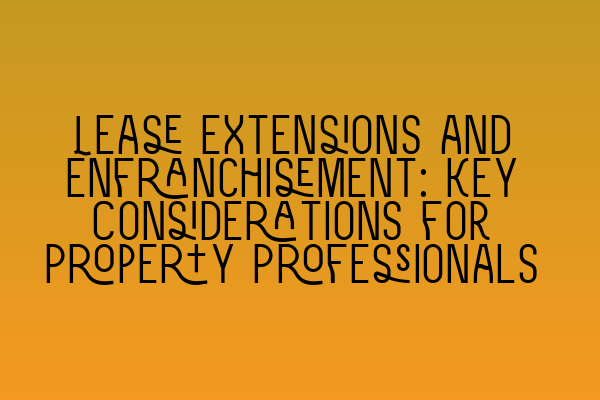Lease Extensions and Enfranchisement: Key Considerations for Property Professionals
As a property professional, it’s essential to have a comprehensive understanding of lease extensions and enfranchisement. These processes can significantly impact the value and marketability of a property, so being well-versed in the intricacies of lease extensions and enfranchisement is crucial for providing effective advice and representation to clients. In this article, we will explore the key considerations for property professionals when dealing with lease extensions and enfranchisement.
What is a Lease Extension?
A lease extension occurs when the lease term of a property is extended, typically by 90 years. This is a vital process for property owners who wish to maintain and enhance the value of their investment. A short lease can be a significant obstacle when trying to market a property, as potential buyers may be deterred by the limited amount of time left on the lease. By extending the lease, property owners can increase the attractiveness and marketability of their property.
When advising clients on lease extensions, property professionals need to consider the following:
1. Eligibility for a Lease Extension
Before recommending a lease extension, property professionals must determine whether the client is eligible. In general, leaseholders who have owned the property for at least two years are eligible for a lease extension. However, there may be exceptions and additional criteria depending on the specific circumstances. It’s crucial to thoroughly review the lease agreement and consult relevant legislation to ensure eligibility.
2. Valuation and Negotiation
Valuing the lease extension is a critical step in the process. Property professionals must consider factors such as the property’s market value, the remaining lease term, and the potential for future ground rent increases. A thorough understanding of local property values and market trends is essential for accurate valuation. Additionally, negotiation skills are vital to secure the best possible terms for the lease extension.
To deepen your understanding of property valuation for lease extensions, we recommend reading our article on SQE 1 Practice Exam Questions.
3. Statutory vs. Informal Lease Extensions
Property professionals must also consider whether to pursue a statutory or informal lease extension. A statutory lease extension is governed by the Leasehold Reform, Housing, and Urban Development Act 1993, which provides specific rights and procedures for leaseholders. However, an informal lease extension can be negotiated directly with the landlord, potentially resulting in more flexibility and favorable terms. Property professionals must assess the pros and cons of each approach based on their client’s circumstances.
What is Enfranchisement?
Enfranchisement refers to the process of purchasing the freehold of a property or joining a collective enfranchisement group to collectively purchase the freehold. This is a considerable undertaking that can offer various benefits to leaseholders, including increased control over the management of the property and the potential for financial savings in the long term.
Here are some considerations for property professionals when dealing with enfranchisement:
1. Eligibility for Enfranchisement
Property professionals must assess whether a property is eligible for enfranchisement. Eligibility criteria can vary depending on factors such as the number of flats in the building, the length of the individual leases, and the participation of leaseholders. Thoroughly reviewing the relevant legislation, such as the Leasehold Reform Housing and Urban Development Act 1993, is critical to determine eligibility.
2. The Collective Enfranchisement Process
The collective enfranchisement process involves forming a group of leaseholders who collectively purchase the freehold of their property. Property professionals must guide clients through this complex process, which includes multiple stages such as forming the group, serving the initial notice, negotiating the price, and completing the purchase. Attention to detail and expertise in enfranchisement law are vital for ensuring a smooth and successful process.
To enhance your knowledge of the collective enfranchisement process, we recommend enrolling in our SQE 2 Preparation Courses.
3. Leasehold Valuation Tribunals
In some cases, disputes may arise during the enfranchisement process, particularly concerning the purchase price or the terms of the acquisition. Property professionals need to be familiar with the role of the Leasehold Valuation Tribunals (LVTs) in resolving such disputes. The LVTs have the authority to make binding decisions on matters such as the premium payable for a lease extension or the purchase price for enfranchisement.
If you want to brush up on your knowledge of the Leasehold Valuation Tribunals, we recommend checking out our comprehensive SQE 1 Practice Mocks FLK1 FLK2.
The Importance of SEO in the Property Law Sector
To effectively reach and engage with clients in the digital age, property professionals must incorporate sound search engine optimization (SEO) practices into their online presence. By optimizing website content and incorporating relevant keywords, property professionals can attract more organic traffic and increase their visibility in search engine results.
If you’re interested in learning more about SEO for property professionals, we recommend exploring our SQE 1 Preparation Courses. These courses cover a wide range of topics, including SEO strategies tailored to the property law sector.
At SQE Property Law & Land Law, we understand the importance of staying ahead in the digital landscape. That’s why we offer comprehensive training and resources for property professionals seeking to enhance their knowledge and skills in areas such as lease extensions, enfranchisement, and SEO.
Stay updated on the latest SRA SQE exam dates and ensure you’re fully prepared by clicking here: SRA SQE Exam Dates.
By keeping up to date with the latest developments in lease extensions, enfranchisement, and SEO, property professionals can position themselves as knowledgeable and trusted advisors to their clients. With a solid understanding of the key considerations in these areas, property professionals can provide expert guidance and representation, ultimately ensuring the best outcome for their clients.
